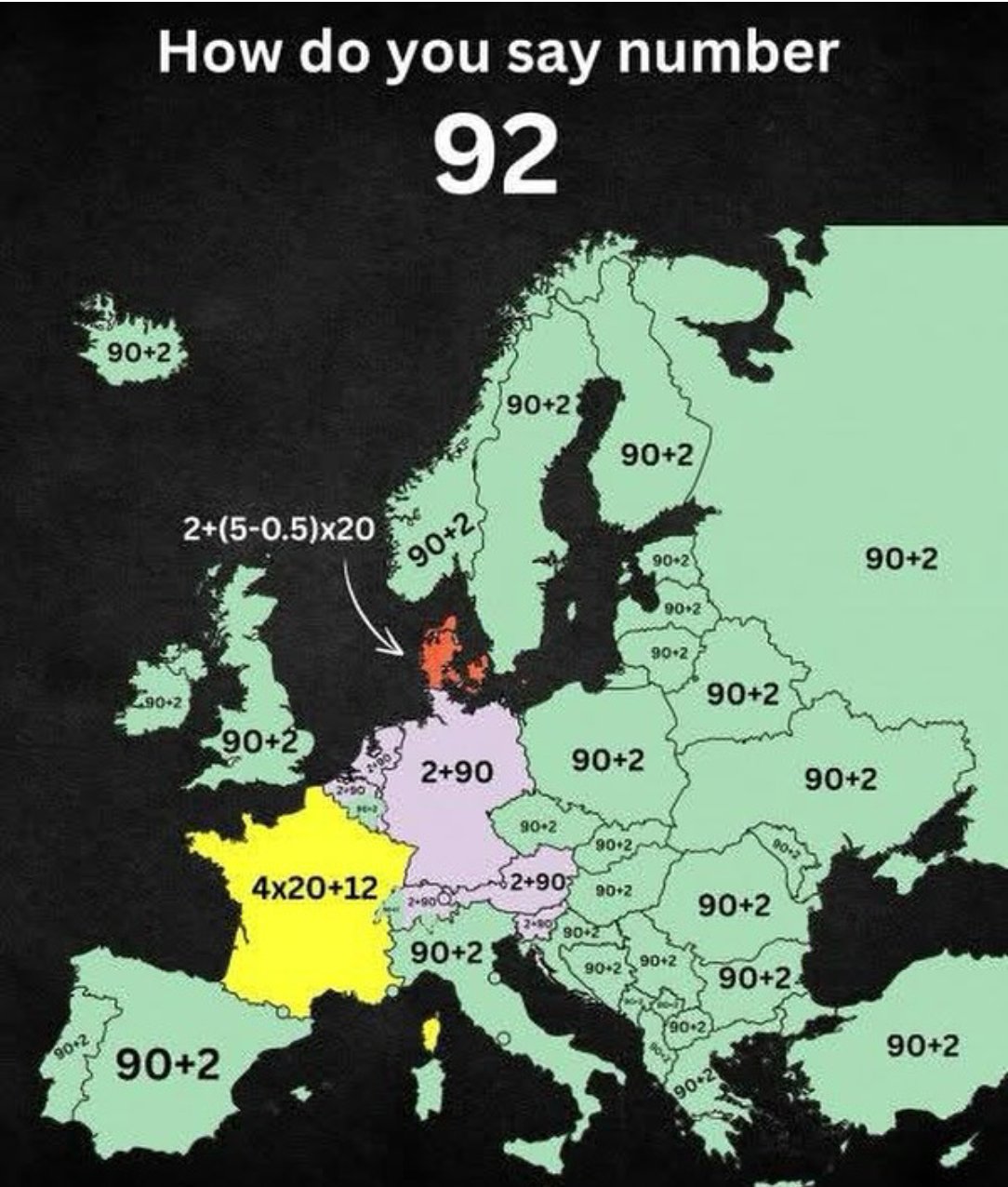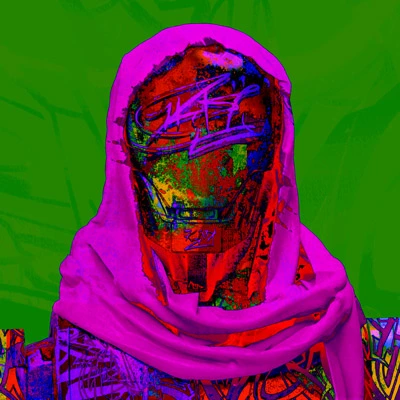Ok, Lemmy, let’s play a game!
Post how many languages in which you can count to ten, including your native language. If you like, provide which languages. I’m going to make a guess; after you’ve replied, come back and open the spoiler. If I’m right: upvote; if I’m wrong: downvote!
My guess, and my answer...
My guess is that it’s more than the number of languages you speak, read, and/or write.
Do you feel cheated because I didn’t pick a number? Vote how you want to, or don’t vote! I’m just interested in the count.
I can count to ten in five languages, but I only speak two. I can read a third, and I once was able to converse in a fourth, but have long since lost that skill. I know only some pick-up/borrow words from the 5th, including counting to 10.
- My native language is English
- I lived in Germany for a couple of years; because I never took classes, I can’t write in German, but I spoke fluently by the time I left.
- I studied French in college for three years; I can read French, but I’ve yet to meet a French person who can understand what I’m trying to say, and I have a hard time comprehending it.
- I taught myself Esperanto a couple of decades ago, and used to hang out in Esperanto chat rooms. I haven’t kept up.
- I can count to ten in Japanese because I took Aikido classes for a decade or so, and my instructor counted out loud in Japanese, and the various movements are numbered.
I can almost count to ten in Spanish, because I grew up in mid-California and there was a lot of Spanish thrown around. But French interferes, and I start in Spanish and find myself switching to French in the middle, so I’m not sure I could really do it.
Bonus question: do you ever do your counting in a non-native language, just to make it more interesting?
1. Python
for i in range(11): print(i)2. R
for (i in 0:10) { print(i) }3. C/C++
#include <iostream> int main() { for (int i = 0; i <= 10; ++i) { std::cout << i << std::endl; } return 0; }4. Java
public class CountToTen { public static void main(String[] args) { for (int i = 0; i <= 10; i++) { System.out.println(i); } } }5. Lua
for i = 0, 10 do print(i) end6. Bash (Shell Script)
for i in $(seq 0 10); do echo $i done7. Batch (Windows Command Script)
@echo off for /l %%i in (0,1,10) do ( echo %%i )8. Go
package main import "fmt" func main() { for i := 0; i <= 10; i++ { fmt.Println(i) } }9. Rust
fn main() { for i in 0..=10 { // 0..=10 includes 10 println!("{}", i); } }10. Zig
const std = @import("std"); pub fn main() !void { var i: i32 = 0; while (i <= 10) { std.debug.print("{}\n", .{i}); i += 1; } }11. Scala
for (i <- 0 to 10) { println(i) }12. Fortran
program count_to_ten implicit none integer :: i do i = 0, 10 print *, i end do end program count_to_ten13. Haskell
main :: IO () main = mapM_ print [0..10]14. Julia
for i in 0:10 println(i) endIf you didn’t cheat that’s actually pretty impressive.
Yes I cheated. To be fair, I used each of those languages at one point and knew how to do it but was to lazy to look it up again.
Edit: except Fortran
It is astonishingly easy to get basically any LLM to output a simple iteration from one to ten function in all of those languages, and more.
Here’s Assembly:
newline db 0xA ; Newline character section .bss number resb 1 ; Reserve a byte for the number section .text global _start _start: mov ecx, 1 ; Start with 1 mov edx, 10 ; End with 10 loop_start: cmp ecx, edx ; Compare ecx with edx jg loop_end ; If ecx > edx, jump to loop_end ; Convert number to ASCII add ecx, '0' ; Convert number to ASCII mov [number], ecx ; Store the ASCII value in number ; Print the number mov eax, 4 ; sys_write system call mov ebx, 1 ; File descriptor 1 is stdout mov ecx, number ; Pointer to the number mov edx, 1 ; Number of bytes to write int 0x80 ; Call kernel ; Print newline mov eax, 4 ; sys_write system call mov ebx, 1 ; File descriptor 1 is stdout mov ecx, newline ; Pointer to the newline character mov edx, 1 ; Number of bytes to write int 0x80 ; Call kernel sub ecx, '0' ; Convert ASCII back to number inc ecx ; Increment the number jmp loop_start ; Jump back to the start of the loop loop_end: ; Exit the program mov eax, 1 ; sys_exit system call xor ebx, ebx ; Exit code 0 int 0x80 ; Call kernelHere’s FORTRAN
program iterate_from_one_to_ten implicit none integer :: i ! Loop from 1 to 10 do i = 1, 10 print *, i end do end program iterate_from_one_to_tenHere’s COBOL
PROGRAM-ID. IterateFromOneToTen. ENVIRONMENT DIVISION. DATA DIVISION. WORKING-STORAGE SECTION. 01 WS-Counter PIC 9(2) VALUE 1. PROCEDURE DIVISION. PERFORM VARYING WS-Counter FROM 1 BY 1 UNTIL WS-Counter > 10 DISPLAY WS-Counter END-PERFORM. STOP RUN.The assembly doesn’t print 1-10, it prints 1-9 then
:.
Finnish, Swedish, Estonian, Latvian, Lithuanian, Ukrainian, German, Dutch, French, Spanish, Russian, English. Plus, Polish and Norwegian would go mostly right.
So, apparently 12.
However, I can say “I am am apple” in 30 languages. Much more useful.
Uno, dos, très, quatro, cinco cinco, ses
You know it’s kinda hard
3 to 10 but 6 to 5
25 or 6 to 4
You’re pretty fly
For a white guy
… siete, ocho, nueve, des!
Hah! I just needed to get started!
Spelling is probably horrible wrong, but Ima take it. 7! 7 languages, ah, ah, aahhh!

English, French, German, Portuguese, Spanish, and Japanese. Nothing special tbh.
English, Spanish, russian
English:
1 2 3 4 5 6 7 8 9 10
Spanish:
1 2 3 4 5 6 7 8 9 10
French:
1 2 3 4 5 6 7 8 9 10
German:
1 2 3 4 5 6 7 8 9 10
Italian:
1 2 3 4 5 6 7 8 9 10
Greek:
1 2 3 4 5 6 7 8 9 10
Mongolian:
᠐ ᠑ ᠒ ᠓ ᠔ ᠕ ᠖ ᠗ ᠘ ᠙ ᠑᠐
The accent on the German is rather thick, though.
.
German, Cantonese, mandarin, English, French.
I used to know in Swahili too, does that count ?
Turkish, English, German, Greek, Kurmanji, Japanese
Four. English, Hindi, Marathi (native) and Kannada. Sanskrit as well, but it’s a dead language, and I can’t speak Sanskrit because the grammar is extremely complicated. Had it in school for 3 years. So 5, if you’re counting Sanskrit.
I generally count in English, unless I am using another language with my friends (excluding Sanskrit).
Marathi and Kannada??? Do u live in Belgaum?
Nice guess, but no.
Edit: जर्मन आणि मराठी? मी कर्नाटका पासून आहे, त्यामुळे म्हाला मराठी (मातृभाषा) आणि कन्नडा येते. जर्मनी मध्ये फॅमिली आहे का? NRI?
जर्मनी मध्ये फॅमिली आहे का?
नाही नाही. आम्हाला शाळेत ८-१०व्ही अर्ध हिंदी अर्ध जर्मन (१००च्या ऐवजी ५०-५० मार्कांसाठी) असल्यामुळे खूप थोडे जर्मन येते. तेव्हा बी २ पर्यंत यायचे. आता काही येत नाही lol.
पण माझ्या एका मित्राला खूप फायदा झाला जर्मन मुले. आता मस्त जर्मनी मध्ये फुकटात बॅचलर्स करतोय (तिथे जर्मन मध्ये शिकलात तर शिक्षणाची फी जर्मन सरकार भरते).
NRI?
हो, कॅनडा मध्ये.
English (school/friends): one, two, three, four, five, six, seven, eight, nine, ten
German (school): eins, zwei, drei, vier, fünf, sechs (hehe sex), sieben, acht, neun, zehn
Marathi (native): Ek, don, teen, char, pach, saha, saat, aath, naoo, daha
Hindi (friends/school): Ek, do, teen, char, panch, cchah, saat, aath, naww, thus
I have not heard of Marathi, but from the context, you’re Indian? Hindi is the official national language, but most Indians grow up learning a local regional language at home, IIRC.
you’re Indian?
Yepp
Hindi is the official national language
Oh noooo nonono. This is a large misconception (kinda one that was spread intentionally).
So here’s the deal. India is very similar to Europe, in that there are hundreds of little cultures that have had very different histories, very different cultures, very different religious practices, etc. At no point in history was India (the current borders) under one state, just like Europe wasn’t under one state.
India has 22 official languages, out of which Hindi is the most spoken one (largely in northern India in the basin of the Ganga).
Hindu nationalists have this idea that India needs to be a nation state to protect itself from foreign threats. “A very important step towards that is by having one language that is spoken by all. English can’t be that language cuz it belongs to the colonizers. Hindi however, is Indian. Hence, all Indians must speak it.”
The problem however, is that those that don’t speak Hindi don’t want Hindi imposed on them. According to them, English is a perfectly fine bridge language. South Indians generally hold this position. Their languages are very very different from Hindi. Even their scripts are different (like how English and Japanese have different scripts).
Lemme explain this by giving an example of Europe. Imagine Britain colonizes all of mainland Europe. Europe has never been united before. However, to defeat the British, Europe unites for the first time. They drive the British out, and establish their own state.
Now, a group of Catholic Christian nationalists believe that Europe must become more united to fight against such threats. They want all Europeans to speak one language. This language turns out to be German. State institutions across Europe start making their employees only talk in German. Understandably, the French are pissed with this.
That’s kinda what’s happening in India right now. Many (especially south Indians) are pretty mad about this and are resisting.
I have not heard of Marathi
It’s the language spoken in the state of Maharashtra (whose capital is Mumbai).
83 million people speak it natively, while 16 million speak it as a second language. It shares the same script with Hindi. So if you know Marathi, it’s kinda easy to learn Hindi and vice versa. There are many common words and stuff. I think a huge majority of Marathi folk can speak an ok amount of Hindi today (largely because of internal immigration from North India to cities in Maharashtra and the aforementioned “Hindi imposition”).
Thanks for the detailed explanation! I’ve worked with a ton of Indians (software development, East coast US), and I picked that up from one of them. It hadn’t occurred to me to verify it, mainly because it wasn’t critical knowledge for me; just trivia.
Thanks for the detailed explanation!
Aww no worries <3
picked that up from one of them
Ah. Nah, it’s a case of “repeat a lie again and again till it becomes the truth”. I vaguely remember us being taught about this national language thing in school too! Kinda like the Mandela effect (but very likely spread intentionally).
For this question exactly I can claim 6, but beyond counting to 10 I know very little in most of these.
- English (native language)
- Spanish (took a couple years in high school)
- French (took one class in middle school)
- Japanese (took a semester in college)
- Malayalam (parents’ native language)
- Hindi (popular old song with Madhuri Dixit where the chorus counts up to 13, lol)
popular old song with Madhuri Dixit where the chorus counts up to 13
LMFAO I would’ve never expected someone to reference that song on Lemmy of all places!!! Such a goofy song lol
13? Another commenter said they’d learned counting to 7 in Chinese (Cantonese?) because of a song that cuts off at 7. And both 7 and 13 are significant in US culture, 7 being lucky and 13 unlucky… I wonder if there’s a relationship based on immigration and the cultural blending?
13 is an odd number, though. 12 is widely significant, as are 5 and 10, but 7 and 13 are strange picks.
Nah the 13 in the song has nothing to do with the unlucky part. It’s just that the song is a goofy ass song lol. The lyrics literally start with “ding dong ding ding dong ding dong”. It’s basically a woman asking her lover or whatever to come home (not in the ding dong part of course).
She’s like, “I waited 1, 2, 3 - 13 days” for you and you didn’t come. On the 14th day, I did this, on the 15th I did this, on the 17th I realized we broke up, my heart shattered on the 20th and so on. Many find the song nostalgic (not me, cuz I’m not from that generation). For me it’s just another old random annoying-ish Bollywood song.
Also, just to add to my previous comment a little with a live example here:
Kazaxat’s (the person whose comment you replied to) parents are Malayali. They’re from the south Indian state of Kerala. See how Kazaxat doesn’t speak Hindi? Kerala is one of the states resisting Hindi imposition. Also remember how I said that the land of modern India was never under one state? Kerala was one of the lands never under the rule of any state in the Ganga basin.
Also, the actress dancing in the song above is Madhuri Dixit, who is Marathi.
Here’s a link to the song if you’ve suddenly become curious lol. Disclaimer: it’s just another silly old Bollywood song. So if u’r not into that, u ain’t missing anything.
I can count to ten in more language than I am able to speak (I just love learning stuff):
Can count above ten:
German (native), English, Norwegian, Romanian, Russian, JapaneseCan count only up to ten:
French, Polish, MandarinI am learning Romanian at the moment, those are 0-10: zero,
unu/ una,
doi/ două,
trei,
patru,
cinci,
șase,
șapte,
opt,
nouă,
zeceWell if you can count to ten in mandarin, you can count to 100.
It’s literally 5 10 2, 5 10 3 for 52, 53 etc.
Add one more word for hundreds, one more for thousands.
After that it gets tough cause numbers beyond thousands are split by packs of 10 thousands, not hundred thousands like most western world (I guess).
Similar to the lakh in Indian
Oh, just like in Japanese, did not know that, they have the ten thousands quirk too. Would love to learn more Chinese and other languages, but I lack free time.
It’s coming from the abacus, meaning most likely all of Asian languages have this.
I wonder about Arabic ones ?
Dutch, English, French, German, Spanish, Italian, Norwegian, Swedish, Danish, Latin, Kmer.
Wow. Impressive list!
Yeah, no issue with counting to 10. The rest however… Im really bad in learning languages, I’ve had German and French in school for 13 years yet I can’t speak either. I know English besides Dutch because of the internet and subtitles on TV. I wanted to learn languages like Norwegian, Latin and Russian but I gave up because I just don’t remember words that well. Same with history, I remember stories but can’t remember dates. I’m better at logic, like math and chemistry. But at least I know how to order up to 10 beers in multiple languages.
at least I know how to order up to 10 beers in multiple languages.
Critical life skills !
Most languages go all wonky after 10. German is pretty regular after 12 (12 is such an important number in human history!), French is absolutely insane. Conlangs like Esperanto are the really only highly regular ones.
German and Dutch (my native language) are similar systems. Still weird imo, naming the numbers in the wrong sequence: 32 is “two and thirty” instead of “thirty two”.
Check out the system of Denmark. French looks rather normal after seeing the Danish.

I love this map!
- English (native), Welsh, French, Spanish, German, and binary if I use my fingers 🙌
EDIT:Bugger, it’s 5. I can’t remember 6 and 10 in German 🙈
“Fünf” I can understand, but you forgot sex?? :-)
Funnily enough, I always remember it wrong 🙈
Actually, it’s the words that the the same as native words which are the hardest to remember, IME, because you’re always questioning it, or you go reaching for a “foreign” word, but if it’s also a native word…
Funny little story. When I first came back from living in Germany, I’d occasionally forget the English word for things and could only remember the German ones. I don’t know if that happens to many people, but that last year, I don’t think I spoke English with anyone more than a couple of times.











